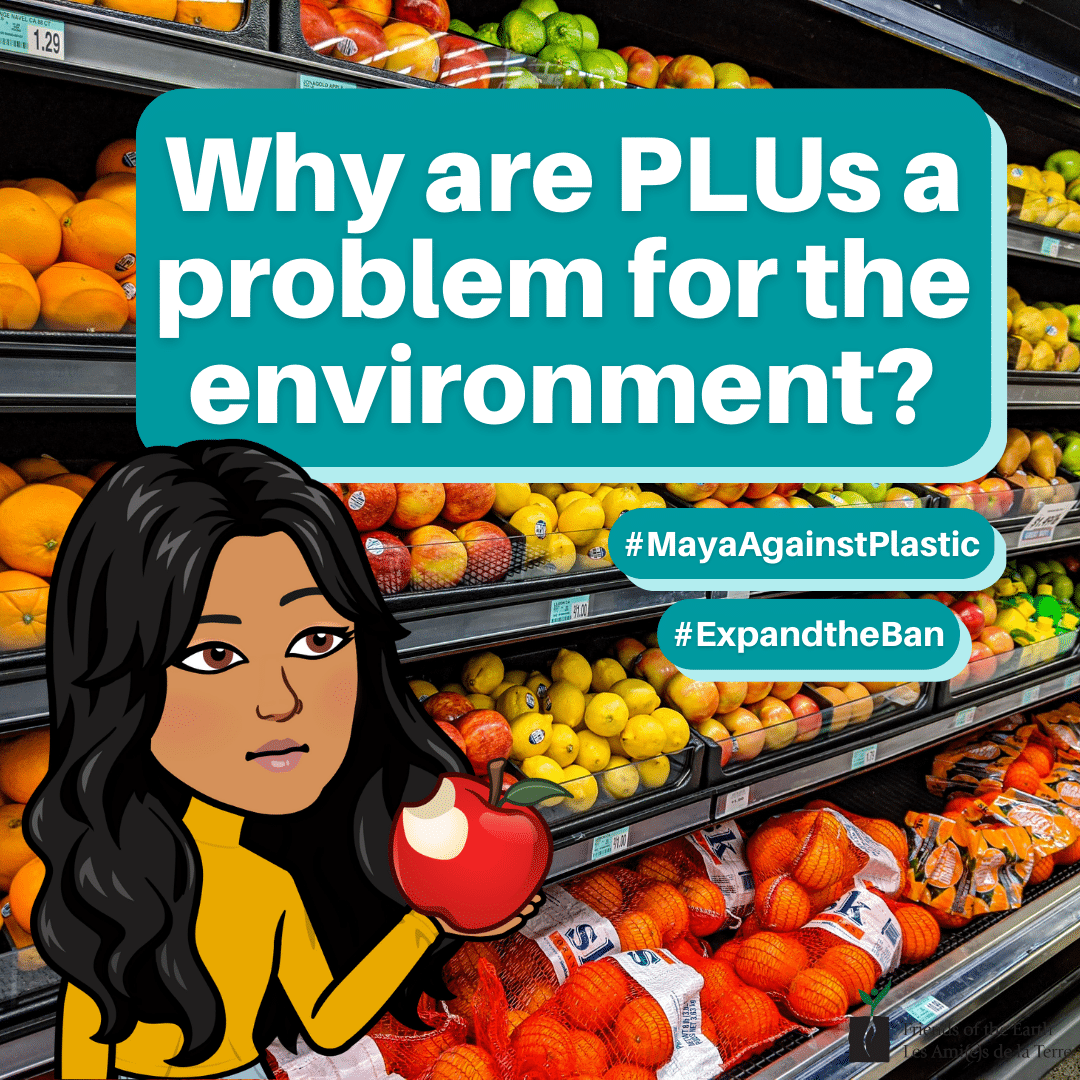
Maya’s Plastic Pollution Campaign
A little girl launches a big campaign to get rid of those little stickers on fruit and vegetables
(Ottawa) Ten year old Maya Thiru who lives in the GTA has turned a visit to the grocery store with her Mom into a Friends of the Earth Canada environmental campaign. Maya’s Plastic Pollution Campaign hopes to mobilize kids and parents and teachers across Canada in the struggle to rid the planet of plastic pollution. She is supporting Friends of the Earth’s call to Environment and Climate Change Minister Stephen Guilbeault to expand the single use plastic ban to include stickers on fruits and vegetables.
“They are just little bits of plastic but they are on everything and cause lots of problems for the environment,” said Maya.
Maya is inviting kids and schools and everybody to join her over March and April to learn about plastic pollution from Price Look Up stickers and make their own album of PLU stickers by removing the stickers from their produce. Her campaign goal is to get lots of kids and families to collect and make their own album of PLU stickers to send to their Member of Parliament asking for their support to ban plastic PLU stickers.
“Maya is part of the upcoming generation of environmental activists dedicated to protecting people and the planet. All of us here at Friends of the Earth Canada are inspired and excited to be working with such a bright and dynamic young woman,” said Beatrice Olivastri, CEO of Friends of the Earth Canada.
When Maya and her mother went shopping they didn’t dash through the store to get grocery shopping done. They took the time to examine the attractive displays of fruit and vegetables. They were shocked to notice, for the first time, that rows upon rows of produce carried these little oval stickers with code numbers. These are called Produce Look Up stickers or PLUs.
Produce stickers carry a price look-up code (PLUs) to help grocery stores track their inventory and, at checkout counters, identify the product and its cost. The problem is they’re made out of plastic or paper coated with plastic. Plastic PLUs don’t break down. They become plastic pollution in our soil and water.
Susan Antler, the Executive Director of the Compost Council of Canada, says that these stickers present a major issue when they show up in their compost facilities across Canada. If PLUs are put in the compost bin, they will end up at the municipality’s composting or anaerobic digestion facility where sorting them out is time-consuming and expensive. The stickers are extremely thin and pliable so they can pass through screens designed to catch them and other non-compostable items. When a load of organic material from green bins and other sources contains many plastic PLUs as well as other non-compostable items, it can get sent to a landfill site instead of the composting facility. In a landfill, the organic matter will break down creating methane, a greenhouse gas that contributes to climate damage.
Barry Orr, a member of the Canadian Water and Wastewater Association, says that if PLUs go down your sink when you’re washing fruit or vegetables, they can help to create “fatbergs” in the sewer lines. A “fatberg” is a wad of waste matter in a sewer line formed by a combination of non-biodegradable solids from sinks, tubs and toilets. This can include fat, oil and grease as well as PLUs, supposedly “flushable” wet wipes and non-flushable wipes plus paper towels and many other items that should never be put down drains. Also, PLUs are thin and flexible so they can pass through the wastewater plant’s screens ending up in rivers and lakes. Fish and wildlife can mistake the plastic PLUs for food and eat them.
Maya Thiru went looking for an environmental group that would help her make a difference to stop pollution that harms wildlife. Maya is 10 years old and the conservation and environmental groups she approached said that’s too young. Friends of the Earth Canada took a different approach and assembled a team of staff and volunteers to work with Maya on a serious and growing environmental crisis – plastic pollution.
You can read about how to join Maya’s Plastic Pollution Campaign at foecanada.org.




